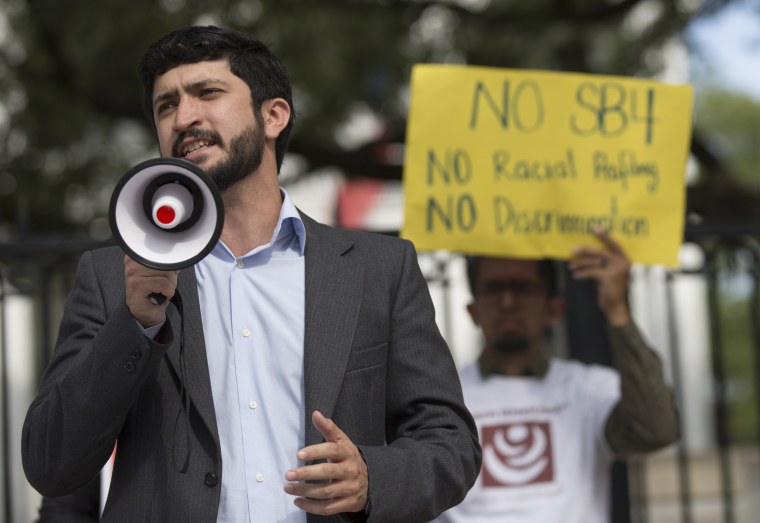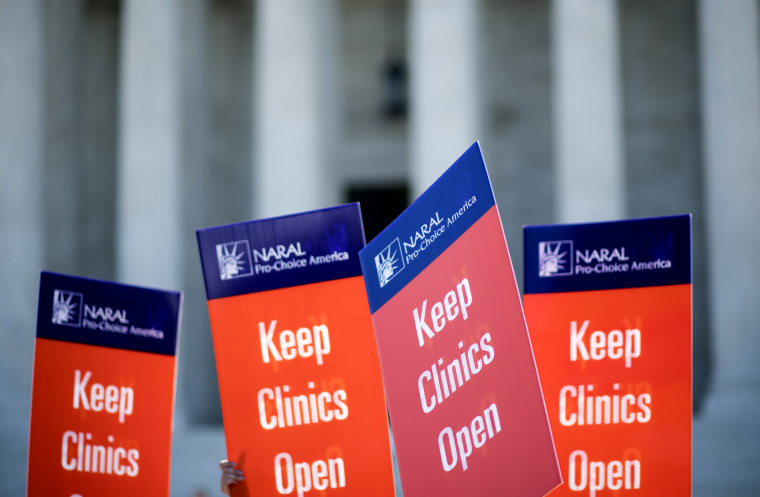City council members in Austin, Texas, voted Tuesday to allocate $150,000 to make abortion care more accessible to low-income women by funding services like travel, lodging, child care and other logistical support for women who need the procedure.
The funding, part of the municipal budget package passed Tuesday night by the Austin City Council, makes the Texas capital the first-ever U.S. city to publicly fund logistical support for abortion care, experts said. The move follows several other high-profile efforts by progressive cities and states in recent months to provide women with financial and other assistance for easier access to abortions.
"Every day the anti-abortion elements in Texas, in Washington, D.C., and elsewhere, wake up and think, 'How can we restrict access to abortion today.' That makes it our job, every day, to work to expand access to abortion and health care and other basic services related to abortion," Austin City Council member Greg Casar, a co-sponsor of the budget amendment, told NBC News.
Austin Mayor Steve Adler added in statement that "the City of Austin has taken action to address challenges people are facing as a result of State and Federal laws that make it difficult for families seeking an abortion."
"This budget amendment will help ensure Austinites can make the best choices for themselves and their families," Adler said. Under Austin city rules, Adler votes on budget proposals with the rest of the Council, but does not need to sign a passed budget into law.
Under the provisions of the budget amendment, the $150,000 will be given to Austin’s Public Health Department, which will then make it available, via a competitive bidding process, for groups that are already providing so-called “logistical” support for poor women who need abortion care.
That support includes access to services that effectively act as barriers to abortion for poor women, including the cost of travel to and from abortion clinics, lodging (if the woman wants to keep the procedure private from the people she lives with), and child care. The money cannot be used for abortion care itself.
"This is a really creative way to meet some very serious unmet needs,” said Amanda Williams, the executive director of the Lilith Fund, an abortion fund in central Texas that advised city lawmakers on the measure.
Under the measure, the money will only be made available to people from Austin. If the abortion can be performed at a clinic in Austin (under Texas law, abortions are illegal after the 20th week of pregnancy), it will be, and the money will be applied toward logistics facilitating care in the city. But if there is a scenario where a woman would need to travel to a state where abortion care is legal after the 20th week of pregnancy — an increasingly common trend as more states pass laws to limit or ban abortion — the money can be used to help the woman travel out of state.
Advocates of the funding told NBC News it would not violate any of Texas’ restrictive abortion laws. Rather, they explained, the bill would merely help low-income women who need abortion care navigate a complicated landscape.
“When you’re seeking abortion care in Texas, there are a host of laws on the books that create additional barriers, delays and costs,” said National Institute for Reproductive Health President Andrea Miller.
Those laws include the requirement that a pregnant woman visit an abortion clinic twice (a woman must undergo a sonogram and then wait 24 hours after to have the abortion). This requirement means someone might have to miss at least two days of work. In addition, Texas law bans private insurance from covering abortion care, meaning all such care must be paid for out of pocket.

Casar, Miller and others told NBC News they were confident the funding would also not violate SB22 — a state bill enacted earlier this year banning any municipality in Texas from allocating public funding to groups that provide abortion care — because it does not actually fund the procedure.
The measure was inspired by one put into place by the New York City Council, which was approved earlier this year. New York City's council members allocated $250,000 for abortions for poor women who live in, or who have traveled to, the city specifically to receive the procedure — the first time a municipality directly allocated money for abortion that could be explicitly used for residents from other locales.
“We may not be able to fund abortion with city money like New York did, but definitely we knew we could help fund the transportation, the accommodations, the child care people needed,” said NARAL Pro-Choice Texas executive director Aimee Arrambide.
The measure comes as a rash of states have passed restrictive abortion laws intended to strike at Roe v. Wade. While many of those laws have already been challenged in court, Casar said he hopes that Austin’s action can “provide a model” for how blue cities in red states can still advance abortion rights.
“It’s really important for our progressive cities to not just be sites of resistance, but to also be places of progress, to be examples of what governance could look like if progressives ran more of our states,” he said.
“So that people see what we’re fighting for, not just what we’re fighting against.”

